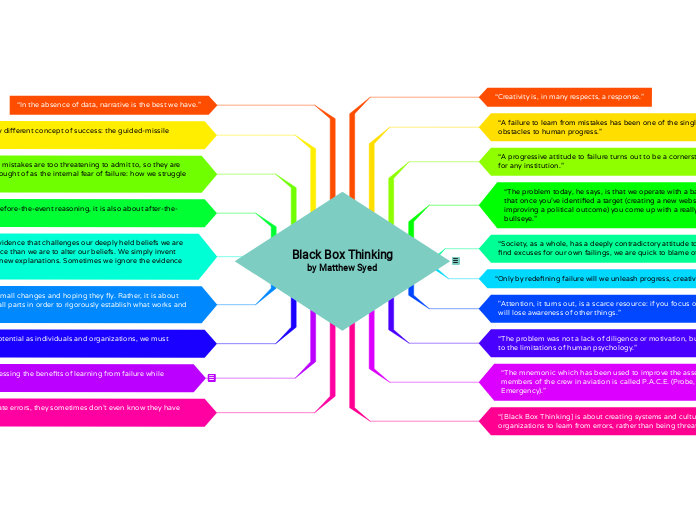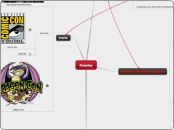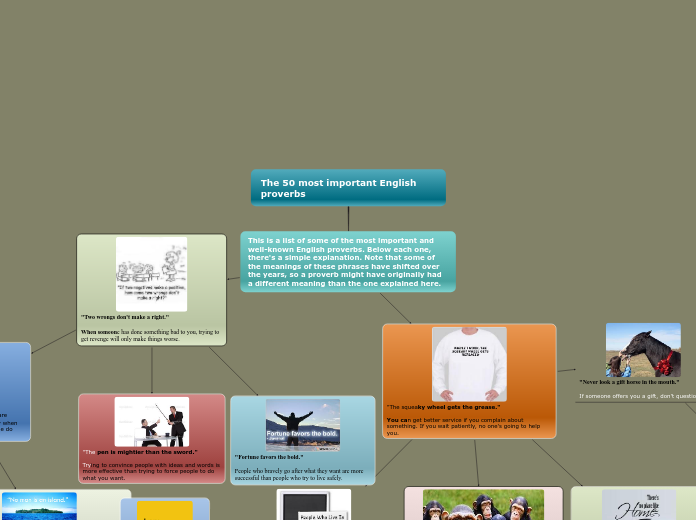Black Box Thinking
by Matthew Syed
What is Black Box Thinking?
According to Syed, “[Black Box Thinking] is about the willingness and tenacity to investigate the lessons that often exist when we fail, but which we rarely exploit.” Furthermore, ““It is about creating systems and cultures that enable organizations to learn from errors, rather than being threatened by them.”
“When people don’t interrogate errors, they sometimes don’t even know they have made one .”
“In effect, practice is about harnessing the benefits of learning from failure while reducing its cost."
"It is better to fail in practice in preparation for the big stage than on the big stage itself. This is true of organizations, too, which conduct pilot schemes (and in the case of aviation and other safety critical industries test ideas in simulators) in order to learn, before rolling out new ideas or procedures. The more we can fail in practice, the more we can learn, enabling us to succeed when it really matters.”
“If we wish to fulfill our potential as individuals and organizations, we must redefine failure.”
“Marginal gains is not about making small changes and hoping they fly. Rather, it is about breaking down a big problem into small parts in order to rigorously establish what works and what doesn’t.”
“When we are confronted with evidence that challenges our deeply held beliefs we are more likely to reframe the evidence than we are to alter our beliefs. We simply invent new reasons, new justifications, new explanations. Sometimes we ignore the evidence altogether.”
“Success is not just dependent on before-the-event reasoning, it is also about after-the-trigger adaptation.”
“Cognitive dissonance occurs when mistakes are too threatening to admit to, so they are reframed or ignored. This can be thought of as the internal fear of failure: how we struggle to admit mistakes to ourselves.”
“Professor Lane recommends an entirely different concept of success: the guided-missile approach.”
“In the absence of data, narrative is the best we have.”
“[Black Box Thinking] is about creating systems and cultures that enable organizations to learn from errors, rather than being threatened by them.”
“The mnemonic which has been used to improve the assertiveness of junior members of the crew in aviation is called P.A.C.E. (Probe, Alert, Challenge, Emergency).”
“The problem was not a lack of diligence or motivation, but a system insensitive to the limitations of human psychology.”
"Attention, it turns out, is a scarce resource: if you focus on one thing, you will lose awareness of other things.”
“Only by redefining failure will we unleash progress, creativity, and resilience.”
“So, just to re-emphasize, for our purposes a closed loop is where failure doesn’t lead to progress because information on errors and weaknesses is misinterpreted or ignored; an open loop does lead to progress because the feedback is rationally acted upon).”
“Society, as a whole, has a deeply contradictory attitude to failure. Even as we find excuses for our own failings, we are quick to blame others who mess up.”
“It is partly because we are so willing to blame others for their mistakes that we are so keen to conceal our own. We anticipate, with remarkable clarity, how people will react, how they will point the finger, how little time they will take to put themselves in the tough, high-pressure situation in which the error occurred. The net effect is simple: it obliterates openness and spawns cover-ups. It destroys the vital information we need in order to learn.”
“The problem today, he says, is that we operate with a ballistic model of success. The idea is that once you’ve identified a target (creating a new website, designing a new product, improving a political outcome) you come up with a really clever strategy designed to hit the bullseye.”
“A progressive attitude to failure turns out to be a cornerstone of success for any institution.”
“A failure to learn from mistakes has been one of the single greatest obstacles to human progress.”
“Creativity is, in many respects, a response.”









